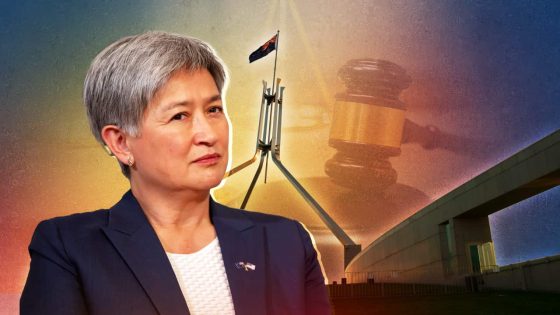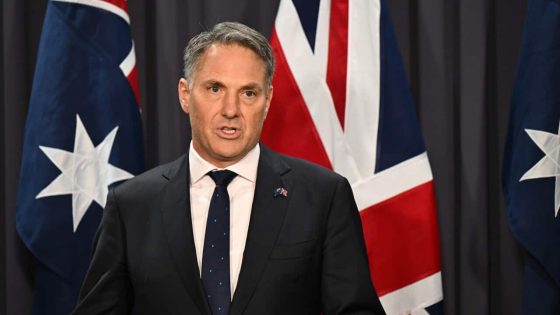Key Points
- Australia imposes sanctions under international law obligations, as well as part of its own foreign policy.
- There are 24 sanctions regimes imposed by Australia, including both ‘autonomous’ and those required by the UN.
- Experts say it’s hard to measure the effectiveness of sanctions.
The Australian government has announced new targeted sanctions — including financial sanctions and travel bans — against five Iranians involved in the repression of protests in Iran.
The sanctions were imposed on Monday, the second anniversary of the incarceration and death of Mahsa Amini.
On 16 September 2022, Amini was arrested in Tehran by Iran’s so-called ‘morality’ police for allegedly not complying with the country’s mandatory hijab laws.
Her , and solidarity rallies in other parts of the world.
“Mahsa Jina Amini’s death galvanised months of protests in Iran, which were brutally quashed by Iranian security forces,” Foreign Minister Penny Wong said in a statement on Monday.
Wong said the individuals sanctioned on Monday included “senior security and law enforcement officials who have been complicit in the violent repression of protests in Iran”.
“Today’s listings mean the Albanese Government has now sanctioned 195 Iran-linked individuals and entities across multiple sanctions frameworks.”
The Australian Iranian Community Alliance welcomed the move on Monday, but urged the Australian government to do more.
“While these sanctions are a gesture of solidarity, the reality remains that the Islamic Republic continues its heinous acts of violence both within its borders and abroad,” a statement by the group said.
“As Australians, we find it deeply concerning that our government’s policy appears to stop short of holding this murderous regime fully accountable.”
Why does Australia impose sanctions?
Australia currently imposes 24 sanctions regimes. Some are imposed under international law obligations, and others as part of Australia’s own foreign policy.
A spokesperson for the Department of Foreign Affairs and Trade told SBS News Australia currently has listed “1,637 individuals and 550 entities for targeted financial sanctions under Australia’s autonomous sanctions frameworks and under Part 4 of the Charter of the United Nations Act 1945”.
Lara Khider, senior lawyer with the Australian Centre for International Justice, explained to SBS News that the purpose of sanctions is to address situations that Australia has deemed of international concern.
“The impact of sanctions can be highly intrusive and is said to be reserved for the most serious cases. The types of sanctions measures can include targeted financial sanctions and asset freezes as well as travel bans,” she said.
Dr Anton Moiseienko is a senior lecturer of law at the Australian National University. He said that there are two ways in which sanctions can be implemented.
“Sometimes they are imposed by the United Nations (UN) Security Council, and then all countries in the world have to comply with those sanctions,” he said.
“But then there are sanctions that countries choose to put in place because they think it’s a good idea.” Those are called autonomous sanctions.
“Australia has got both those categories of sanctions, and probably the most extensive autonomous sanctions program that’s not required by the UN Security Council is that against Russia.
“Probably the most far-reaching UN-imposed sanctions program is that against North Korea,” he said.
Sanctions regimes can be both country-specific and thematic.
Khider said thematic sanctions — also sometimes referred to as ‘Magnitsky-style’ sanctions — are not geographically restricted and can apply to any individual or entity in the world for conduct that falls into certain “themes”.
Khider said the ‘themes’ that can be the basis for imposing sanctions against targeted individuals are: serious corruption, serious abuses of human rights, significant cyber incidents and the proliferation of weapons of mass destruction.
Who can be sanctioned?
Sanctions can be imposed against individuals or entities.
Moiseienko told SBS News that the typical way in which individuals are sanctioned is by freezing their assets and prohibiting them from travelling to Australia.
“But you could also have companies subject to sanctions, and that means that a company’s assets are frozen in Australia.
“Another consequence is that if you are sanctioned, whether or not you’re an individual or a company, no one in Australia is allowed to transact with you.
“That can be important for people who are based overseas, but want to do business with someone in Australia,” he said.
Sanctions can also be imposed against certain goods. This would mean that the sanctioned goods cannot be imported into Australia or exported from Australia to a sanctioned country.
“Basically, sanctions can relate to individuals, companies, or goods, or certain categories of transactions,” Moiseienko said.
“For example, sanctions can impose the prohibition on the raising of funds in Australia for certain overseas companies. So there’s a really broad spectrum of potential prohibitions that can be imposed under sanctions laws.”
How are sanctions enforced?
For individuals, penalties for contravening Australia’s sanctions laws range from significant fines to up to 10 years in prison. Body corporates can also be punished with fines, reaching into the millions of dollars.
However, Moiseienko said that enforcement is one of the most important existing practical gaps.
“The Australian Sanctions Office was created only several years ago and it has been expanded dramatically.
“The Australian Federal Police is also involved in identifying sanctions violations. But for now, we haven’t seen any prosecutions arising from sanctions evasion over the past couple of years,” he said.
In 2021, a Sydney resident was sentenced to three years and six months in prison after contravening Australian sanctions laws by providing brokering services to North Korea for its sale of arms, military equipment, coal and pig iron.
There have not been any publicly disclosed prosecutions of a company for breaching Australia’s sanctions law.
In July this year, the Senate referred an inquiry into Australia’s sanctions regimes to a parliamentary committee.
Chaired by senator Claire Chandler, the committee will — among other things — assess evidence on how sanctions regimes are targeting and addressing the behaviour of designated individuals and entities, and consider any improvements to the existing regulation.
Submissions closed earlier this month, and a report is due to be published in early 2025.
So, do sanctions work?
According to Moiseienko, it’s difficult to measure the effectiveness of sanctions.
“Most Australian sanctions are imposed in coordination with other countries — the United States, the United Kingdom, the European Union.”
Moiseienko said sanctions are a way of signalling condemnation.
“An interesting recent example is the sanctions designations who hacked into Australian systems, including Medibank.
“When Australia, the US and the UK imposed sanctions against those people, it sent a signal of: ‘We know who you are, we know what you did.’
“Sanctions are that signal of intent. Maybe law enforcement measures will follow at some point,” he said.
Khider said that it had been debated whether sanctions are effective. She believes measuring the effectiveness of sanctions would depend on their objective.
“If the primary objective is to publicly condemn persons alleged of serious misconduct, sanctions effectively achieve this goal,” she said.


